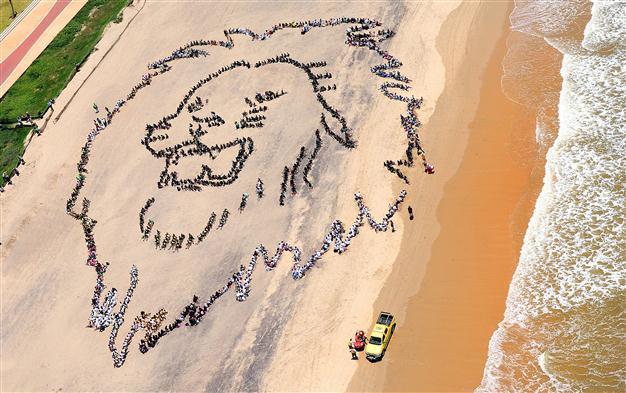Waiting on climate is 'escapism': top UN scientist
DURBAN, South Africa - Agence France-Presse

An handout picture released and made on December 7, 2011 shows thousands of South African youths forming a giant lion head on a beach in Durban, to call for urgent action on climate change. AFP Photo
Leaders who wait for further evidence about the perils of greenhouse gases are flirting with escapism, the head of the UN's Nobel-winning climate scientists says.
"You cannot possibly keep waiting forever for new evidence of global warming to act," Rajendra Pachauri, head of the Intergovernmental Panel on Climate Change (IPCC), said on the sidelines of the UN climate talks in Durban.
The 12-day marathon, ending on Friday, seeks to limit warming to 2.0 Celsius (3.6 degree Fahrenheit), a commonly-accepted danger threshold.
Underpinning this goal is a raft of scientific evidence -- the IPCC's 2007 4th Assessment Report among them -- which says the data for dangerous, man-made global warming is unequivocal.
On current trajectories, according to an assessment by German academics released on Monday, Earth is headed for a sizzling increase of 3.5 degrees Celsius (6.3 degrees Fahrenheit) above pre-industrial times.
Previously published research says this scenario is a near-guarantee of disaster-inducing storms, droughts and floods across swathes of the globe.
But major actors in the climate drama -- China, India, the United States to name three -- have said during the talks that some key decisions should be postponed until after the IPCC's multi-volume 5th assessment report, due out in 2013-2014.
The IPCC produces every five to six years the definitive reference guide for policy makers on global warming and its impacts.
"The (2007) 4th assessment report has enough substance which provides the basis for taking action," Pachauri told AFP in the interview on Wednesday.
"If the world accepts this scientific reality, then surely they should do something about it.
"Certainly, the next report might close a few gaps, make a few refinements. But to say that we will wait for the next report seems like escapism," he said.
Pachauri applauded South African President Jacob Zuma for underscoring in his keynote address the importance of chaining action on greenhouse-gas emissions "to the demands of science." In a Special Report released in November, the IPCC warned that climate change was on track to, in effect, create weather on steroids, boosting the intensity or frequency of extreme events ranging from heatwaves to hurricanes to diluvian downpours.
Pachauri refused to assess the state of play in the talks, where negotiations can get bogged down in mind-numbing details.
But he suggested that they lacked an appropriate "sense of urgency." "Personally, I think it would be very helpful during the negotiations if each day started with a presentation on some aspect of science," he said, betraying a hint of frustration.
"That, perhaps, would at least remind people of the realities." Despite the evident gap between politics and science, Pachauri remained guardedly optimistic.
"Hopefully, human beings -- being rational as they are supposed to be -- will probably decide collectively, in some form or the other, to take action," he said.
He pointed to the Montreal Protocol, the global pact that banned the chemicals ripping a hole in the atmosphere's protective ozone layer, as proof that the world's nations can pull together to solve a global problem.
"This of course is a much larger challenge. But I expect that, as a rational species, we'll do something about it."
